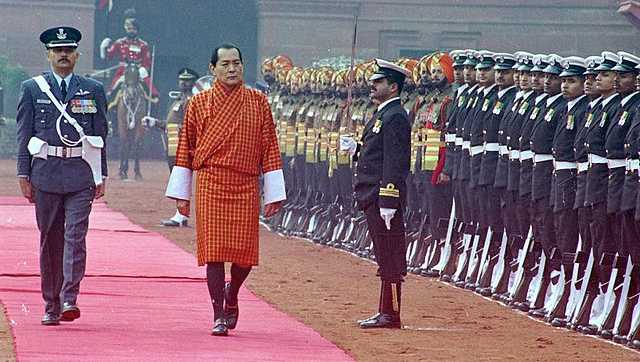“I cycle every night from Paro to Thimphu. I find it meditative”. I was sitting across the Fourth King of Bhutan, listening in awe as the Druk Gyalpo or the “Dragon King” of the Himalayan kingdom narrated tales about his tryst with quiet contemplation. In 2013, when I met him, the ruler had, of course, passed on his reign to his son, Jyigme Khesar Namgyal Wangchuk. But the “relinquishing” of power was perhaps more by way of grooming his son onto the higher duties of a monarch. In senses more than one, K4 decreed over the realm and was perhaps one of the most revered personalities in South Asia. In Bhutan he was a celestial being whose word was divinely ordained without question. I had been warned that I had to be extremely demure in my conversation with the King. I could not, for instance, question him, nor broach a subject which was private or public unless he so desired. I naturally was brimming with queries, but rules are rules, and there was no way I could get round them. But there was something uncanny about K4. He could — like some medieval oracle — fathom all the question marks that were running inside my mind and would veer the subject towards the topic that I was mentally broaching. Our conversation veered to other aspects, about the manner in which he led the Royal Bhutan Army in 2003 onto battle against the Indian insurgents that had been operating against India out of his country. He told me that it was perhaps one of the few times that he wore military fatigues. The over two-hour-long “exchange” also touched upon India-Bhutan relations in the backdrop of the Chinese shadow. But to be truthful it did not go beyond the generic. In any event, the meeting with Jigme Singye Wangchuk was one of the most unbelievable of experiences in my life. India and Bhutan had signed a Treaty of Friendship on 9 August 1949 whereby the two nations agreed on non-interference in each other’s internal affairs. However, Bhutan consented to allow India to “guide” its foreign policy and that both countries would consult each other on foreign and defence matters. However, as Bhutan began moving towards democracy, there were demands from Bhutan to revisit the treaty. Consequently, on 8 February 2007, a new treaty was signed between Pranab Mukherjee the then Minister of External Affairs of India and Jyigme Khesar Namgyal Wangchuk, the then Crown Prince and now King of Bhutan. The new treaty brought two major changes in the earlier treaty of 1949. The most important one is the removal of the clause on the “advice of the Government of India in Bhutan’s external affairs.” The revised Article 2 reads: In keeping with the abiding ties of close friendship and cooperation between Bhutan and India, the Government of the Kingdom of Bhutan and the Government of the Republic of India shall cooperate closely with each other on issues relating to their national interests. Neither Government shall allow the use of its territory for activities harmful to the national security and interest of the other. As a result, Bhutan presently has adequate space to conduct her foreign relations without consulting India. The new treaty also allows Bhutan to import arms, ammunitions etc., which are vital to strengthen the security of Bhutan in consultation with India. Essentially, the Indo-Bhutan relationship is grounded in Bhutan’s sovereignty and securing India’s strategic interests. On 14 October 2021, even as the Galwan crisis was simmering, Bhutan and China signed a Memorandum of Understanding (MoU) on a “three-step roadmap” for expediting negotiations on their boundary dispute. It prompted a cautious response from India against the backdrop of the standoff in Eastern Ladakh. Certain observers felt that Bhutan was drifting away from India. But it is my considered view that that is not the case. Thimphu would have — if not publicly — certainly consulted New Delhi before it signed the MoU. As matter of analysis, it seems that India actually encouraged Bhutan to speed up the boundary negotiations with China. Such a move is important because China is — as things stand at present — not likely to make any concessions in the territory that has strategic implications in the Tibet Autonomous Region. Scenario building suggests that China could retain the option to militarily invade Bhutan to occupy more tactically important territory. Simultaneously, it can create a situation to offset India’s military’s manoeuvrability by exerting pressure on the disputed border with India or its friendly neighbours and by threatening to invade earlier claimed areas of Bhutan, the loss of which will have strategic implications for India in the Eastern Sector. Indeed, there was enough indication that China was seeking to reach the Jampheri Ridge by building a road during the Doklam crisis, the completion of which would have threatened the sensitive Siliguri Corridor. Also, there is sufficient indication to suggest that there is PLA build-up opposite Eastern Bhutan which abuts the Kameng Sector of Arunachal Pradesh. China had already claimed the Sakteng Sanctuary of Bhutan in 2017. The aforesaid build-up—which has also been corroborated by satellite imageries—assess that there could be a new threat to the Kameng Sector which houses the sensitive Tawang region from the west and the south. So far, despite China’s rhetoric about its claim over Tawang, the area of Tashigang in Eastern Bhutan has acted as a natural barrier to any military threat to the Kameng Sector. Chinese move towards the Sakteng wildlife sanctuary could, therefore, pose a new danger to the Kameng sector. [caption id=“attachment_11028971” align=“alignnone” width=“640”]  Author Jaideep Saikia with the Fourth King of Bhutan[/caption] Therefore, a strategic move by India whereby it supports a Sino-Bhutanese boundary agreement would be prudent. After all, a bilaterally negotiated boundary between Bhutan and China would tantamount to India having a strategic buffer in Bhutan. It would stave off any Chinese moves to make inroads into Bhutan in the manner it sought to do during the Doklam crisis. If correctly concluded, China would not be able to renege on its boundary agreement with Bhutan without incurring international censure. An iron-clad Sino-Bhutanese boundary would thereby act as a veritable wall against any nefarious moves by China against India in the Eastern Sector. The author is a conflict analyst. Views expressed are personal. Read all the Latest News , Trending News , Cricket News , Bollywood News , India News and Entertainment News here. Follow us on Facebook, Twitter and Instagram.
An iron-clad Sino-Bhutanese boundary would act as a veritable wall against any nefarious moves by China against India in the Eastern Sector
Advertisement
End of Article


)

)
)
)
)
)
)
)
)



